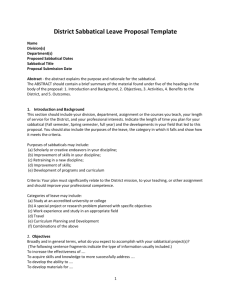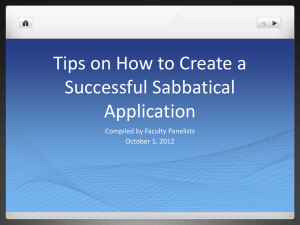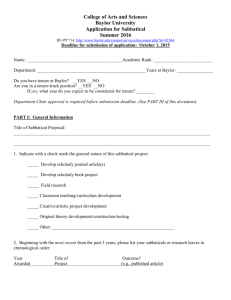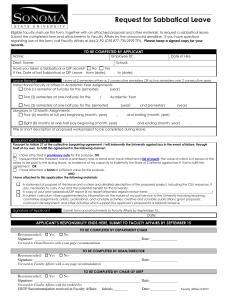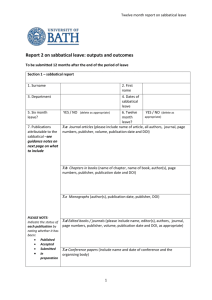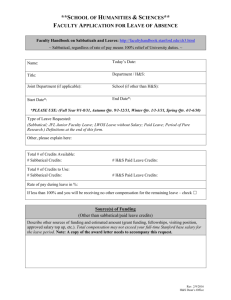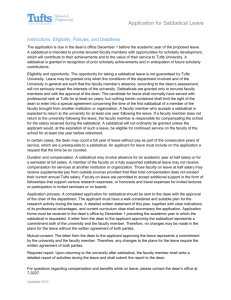Full Sabbatical Policy 2015
advertisement
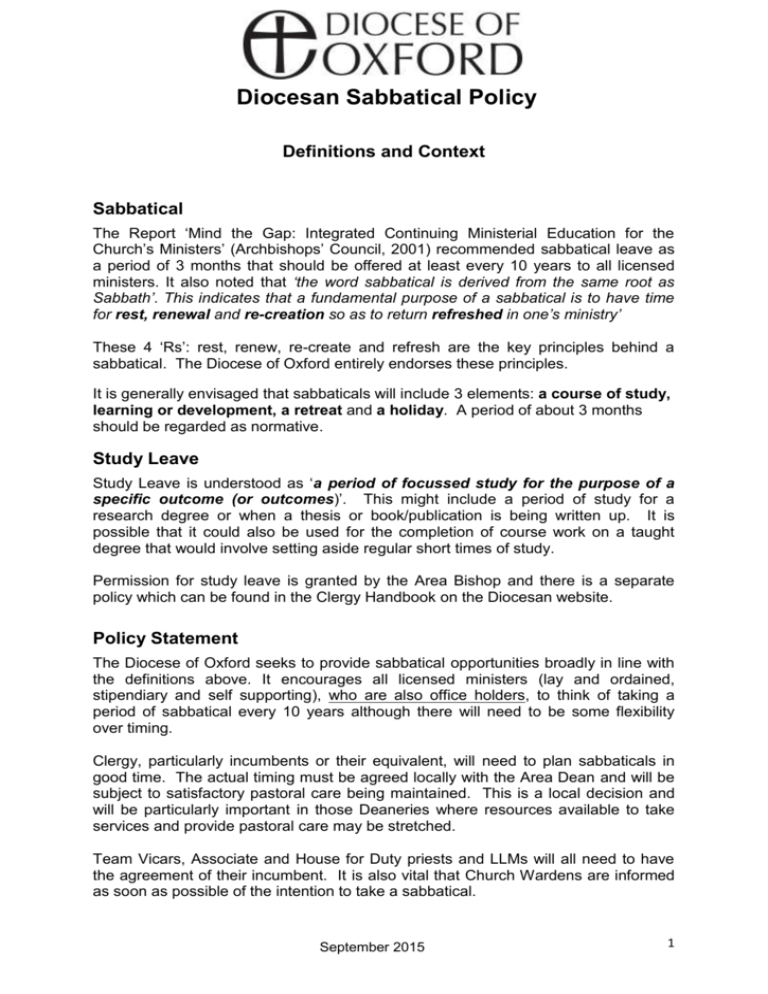
Diocesan Sabbatical Policy Definitions and Context Sabbatical The Report ‘Mind the Gap: Integrated Continuing Ministerial Education for the Church’s Ministers’ (Archbishops’ Council, 2001) recommended sabbatical leave as a period of 3 months that should be offered at least every 10 years to all licensed ministers. It also noted that ‘the word sabbatical is derived from the same root as Sabbath’. This indicates that a fundamental purpose of a sabbatical is to have time for rest, renewal and re-creation so as to return refreshed in one’s ministry’ These 4 ‘Rs’: rest, renew, re-create and refresh are the key principles behind a sabbatical. The Diocese of Oxford entirely endorses these principles. It is generally envisaged that sabbaticals will include 3 elements: a course of study, learning or development, a retreat and a holiday. A period of about 3 months should be regarded as normative. Study Leave Study Leave is understood as ‘a period of focussed study for the purpose of a specific outcome (or outcomes)’. This might include a period of study for a research degree or when a thesis or book/publication is being written up. It is possible that it could also be used for the completion of course work on a taught degree that would involve setting aside regular short times of study. Permission for study leave is granted by the Area Bishop and there is a separate policy which can be found in the Clergy Handbook on the Diocesan website. Policy Statement The Diocese of Oxford seeks to provide sabbatical opportunities broadly in line with the definitions above. It encourages all licensed ministers (lay and ordained, stipendiary and self supporting), who are also office holders, to think of taking a period of sabbatical every 10 years although there will need to be some flexibility over timing. Clergy, particularly incumbents or their equivalent, will need to plan sabbaticals in good time. The actual timing must be agreed locally with the Area Dean and will be subject to satisfactory pastoral care being maintained. This is a local decision and will be particularly important in those Deaneries where resources available to take services and provide pastoral care may be stretched. Team Vicars, Associate and House for Duty priests and LLMs will all need to have the agreement of their incumbent. It is also vital that Church Wardens are informed as soon as possible of the intention to take a sabbatical. September 2015 1 Arrangements for sabbatical cover need to be clearly communicated to the following: Churchwardens and PCC/DCC Team Rector / Incumbent (as appropriate) Area Dean Archdeacon This way, all can be assured that provision is in place for pastoral care, occasional offices and Sunday worship. Prior to your sabbatical commencing please inform the Area Dean and Archdeacon of these arrangements and who should be contacted should an emergency arise All applications must be received by 30 June for the following year. Applications received after 30 June will then be considered for the following year but one (eg applications received after 30 June 2015 will be considered for a sabbatical in 2017). However we appreciate that there may be exceptional circumstances and we want to be sensitive in these situations. (See Appendix B for the Application Form). Ministers may not take a Sabbatical within the first 2 years of a new appointment during the 1st year of the training of a curate serving a title for whom they have responsibility and only in year 2 if appropriate local oversight and supervision has been negotiated and agreed with the Diocesan IME Officer. during the 1st year of a Licensed Lay Minister being first licensed after training unless appropriate local oversight and supervision has been negotiated and agreed with the Diocesan LLM Adviser. for the purpose of actively seeking a new post It is often tempting to see this 3 month period as a time to ‘put right’ life’s stresses and strains. However, we do not believe that this gift of time away from regular ministry should be used for dealing with issues such as serious family or personal problems or when you have been diagnosed with stress or other significant illness. If this is the case, then there are other responses, other than a sabbatical, which need to be explored with your Archdeacon or Area Bishop Eligibility All licensed ministers (lay and ordained, stipendiary and self supporting) who are also office holders, who have: fulfilled at least 10 years of service (not necessarily in the Diocese of Oxford) served 2 years in the current office for whom it has been at least 10 years since their last sabbatical September 2015 2 are eligible to apply for a period of Sabbatical, away from their regular ministry although not all may not qualify for a grant from the Diocese. Please note that ‘eligible for consideration’ is not to be construed as ‘entitled’. Even if you do not intend to request diocesan funding towards the sabbatical, the application process must be followed as licensed ministers still require the Bishop’s permission to be absent from their office. Planning for Sabbatical Given that this gift of time away from parish ministry is only available every 10 years, we do not wish to be too prescriptive and so offer a flexibility of approach to this process which is fundamentally one of discernment. Therefore, each Archdeaconry has appointed an adviser to work with applicants in this discernment process (see Appendix C for fuller details of their role). Sabbatical Aims - It is important to establish aims for Sabbaticals. These, however, need to be modest and achievable in order to get rest, renewal, recreation and refreshment. Too ambitious aims often are unfulfilled and leave a feeling of frustration on return. Some form of retreat early in the sabbatical period is encouraged in order to slow down and then towards the end of the period in order to reflect on what God has been doing during the three months. The sabbatical period offers the opportunity for a closer relationship with a spiritual director or mentor if circumstances allow and if found appropriate. Type of activities – As sabbatical is an opportunity for ‘rest, renewal, refreshment and recreation’ there needs to be a balance in what is planned. During the planning process, it may be useful to think about SPICE – Spiritual, Physical, Intellectual, Creative and Experiential Cost – When planning the outline of the sabbatical, it is important for all costs to be considered and sources of funding identified. The diocese has limited funds that it offers in the form of ‘small grants’. Enough time needs to be allowed for submission of applications, given that many trusts are small and only meet occasionally. Cover – The timing of the sabbatical must be agreed with your Incumbent or the Area Dean prior to the Application being submitted. This is to ensure continuity of pastoral care and that colleagues in the deanery are not put under unreasonable pressure due to a number of ministers being away at the same time. This may require a re-negotiation of when the sabbatical takes place. As already highlighted, it is important that the office holder considers and outlines in the proposal the arrangements made for covering both provision of church services and pastoral care during the sabbatical period. Re-entering Ministry – how one returns to ministry after a lengthy time away is as important as planning the time away. Careful thought needs to be given to the first 2 weeks of your return to avoid immediately over-working and negating all the positive September 2015 3 benefits of the sabbatical / study. You may wish to consider a phased return to full time working. On your return, it is often valuable to engage a work consultant or coach to enable any desired changes to your ministry or work pattern to be explored and implemented successfully. Details can be found on the CMD pages of the Diocesan website Process of Applying for a Sabbatical The flowchart in Appendix A details the procedure when applying for a sabbatical as well as those involved in the process. The process usually begins as a result of a ministry development review (MDR), a conversation with an Area Bishop or on the initiative of the minister. However, before proceeding further, formal approval must be sought firstly from the Area Bishop and then from the Area Dean. Support A limited number of grants are available from the Diocese and those eligible for consideration are: Stipendiary ministers Associate ministers who are giving at least 50% of their time (ie 3 days) to parish / benefice ministry. House for Duty ministers Please note that ‘eligible for consideration’ is not to be construed as ‘entitled’. The maximum available grant will not exceed £500. In the year that the sabbatical is taken, the minister will NOT also be entitled to apply for a separate CMD grant. . When considering the level of grant to be awarded, the Committee cannot take into consideration the costs relating to a holiday. In many cases, additional sources of funding will be needed to support proposals, which is another reason for early planning. Patrons (in some cases), charitable trusts and occasionally the Ecclesiastical Insurance Group can provide funds. Please see Appendix C for suggestions on possible sources of funding. Parishes and deaneries are encouraged to take an interest in sabbaticals by not only helping to provide cover, but also providing help towards the costs of the sabbatical. Given that sabbaticals are only every 10 years and can therefore be planned for in advance, it is recommended that benefices / parishes consider setting up a clergy development fund which can be built up over time to provide financial support when needed. September 2015 4 After your Sabbatical As well as sharing your experience with people in your benefice / parish, we hope the key learning and experience of your sabbatical will be something which you will also want to share with the wider church. We therefore encourage you to think how this might happen and some possibilities are: Sharing with your Deanery Chapter and /or Deanery Synod Meeting with your Archdeaconry Adviser for a ‘debrief’ Requesting a meeting with your Area Bishop or Archdeacon On return, you are asked to notify your Area Adviser how you plan to share your experience. The committee will also ask you to complete a Feedback Form approximately 6 months after you return to parish ministry. This will also be shared with your Area Bishop and Archdeacon (see Appendix E). September 2015 5 APPENDIX A Process of Applying for a Sabbatical Flowchart Bishop/ Reviewer Committee Initial conversation with the Bishop initiated either by the Bishop or Reviewer Archdeaconry Advisor Local permission is negotiated and agreed with Incumbent (if Team Vicar, SSM, House for Duty or LLM) or Area Dean. Licensed Minister The Secretary of the Committee is contacted, who then contacts the Archdeaconry advisor The Archdeaconry Adviser meets with the applicant and discusses the details of setting up a period of Sabbatical Committee discusses the application including any request for funding The Applicant, with the support of the Adviser: 1. completes Sabbatical application form to include: - an outline of the planned activities - budget to show how they plan to finance it - arrangements for cover 2. Obtains approval from the Area Dean for the timing of the sabbatical 3. submits completed application ( by latest 30th of June) Committee decision: Is the application eligible, justified & feasible? No The Applicant is provided with the opportunity to amend the application Yes Sabbatical Leave approved and any application for grant is considered within the defined criteria Decision is communicated to Applicant, Area Bishop and Area Dean and sabbatical goes ahead September 2015 Upon return from Sabbatical, the Area Adviser is advised how the experience and learning will be shared 6 Appendix B Archdeaconry Advisers The role of the Archdeaconry Adviser is to support the individual in discerning how best to use the period available by: Meeting with the individual as early as possible in the planning process Being a critical friend offering feedback on proposals Representing the applicant on the Diocesan Committee Be available, if appropriate, for a debrief meeting after the sabbatical The Archdeaconry Advisers are: Oxford & Dorchester The Rev'd Andrew Gregory Archdeaconries: Tel: 01865 01865 276663 Email: andrew.gregory@theology.ox.ac.uk Berkshire Archdeaconry: The Rev’d Simon Howard Tel: 0118 934 1092 Email: revsimon@lineone.net Buckingham Archdeaconry: The Rev'd Graham Saunders Tel: 01753 643233 Email: revghs@gmail.com Secretary to the Committee: Andrew Gear CMD Team Diocesan Church House Tel: 01865 208256 Email: andrew.gear@oxford.anglican.org September 2015 7 APPENDIX C Sabbatical Application Form All applications for the following year will be considered at the July meeting each year. APPLICATIONS TO BE RECEIVED NO LATER THAN 30TH JUNE 1. Personal Details Full Name: Address: Tel: 2. e-mail: Office Details Role Title: Benefice & Deanery: Date of Licencing : 3. Date of Ordination: Process of Approval Is your application supported by your bishop? Yes / No Does this application arise out of a recent Ministerial Development Review? Yes / No Have you consulted your Area Dean / Lay Chair concerning the timing of your sabbatical? Yes / No If a Team Vicar, SSM, House for Duty priest or LLM, have you the approval of your Incumbent? Yes / No Have you had any period of Study Leave in the past 5 years? Yes / No Are you responsible for a curate in training, or a newly licensed LLM Yes / No If so have you spoken with the respective IME or LLM Officer? Yes / No Please use the space below to give any further information September 2015 8 Details of the proposed sabbatical When would you like to take a sabbatical? From ……………. To ………………. Year …………. £ …...………….… Anticipated Total Cost On a separate sheet of paper please give an outline of: how you plan to spend your sabbatical budget/ cost involved and proposed sources of funding arrangements for cover of office while away APPLICATION FOR GRANT The diocese has a limited number of grants to support sabbatical available for stipendiary clergy, self supporting and house for duty minister, Do you wish to be considered for a diocesan grant? Yes / No What level of grant are you requesting? (maximum of £500) £…………. What other funding have you been able to source to support your sabbatical? (Please tick all that apply) Grant making bodies and trusts Amount £…………. Name of grant making body or trust …………………………….……………………………………… Your parish. Amount £………….. A mission agency. Amount £………….. Name of mission agency……………………………………………...…………………………………… Other sources of funding Amount £…………… Name of source………………………………………………………………..……… Signature………………………………………. Date……………………………………………… Please complete and return together with attachments to: CMD Team Administrator, Diocesan Church House, North Hinksey Lane, Oxford OX2 0NB Email: sheila.townsend@oxford.anglican.org Tel: 01865 208277 September 2015 9 APPENDIX D Details of Grant Making Trusts for Sabbatical Applications American Memorial Chapel Travel Grant Bayne Benefaction Jane Burrell, Secretary, The Bayne Benefaction (Charity No 203262) Walnut Tree Cottage, Oxford Road, Donnington, Newbury RG14 3AG Tel: (01635) 46497 E-mail: Jane@Burrell-Wood.org.uk 37 Charles Street London, W1J 5ED Tel: 020 7529 1550 Fax: 020 7495 6108 Email: education@esu.org Web: www.esu.org Please note that funding will only be provided for specific study programmes or projects. Please check with your archdeacon if in doubt. Culham Educational Foundation EIG Ministry Bursary Award Scheme: For RE and education focussed projects. Go to: http://www.cstg.org.uk/grants/ and this will guide you through the eligibility and application process Michelle Douse Beaufort House Brunswick Rd Gloucester GL1 1JZ Tel: 01452 875562 Website: http://www.ecclesiastical.com/ChurchMatters/ foryouandyourparish/clergy/mba/index.aspx St Georges Trust St Boniface Trust Please go to www.fsje.org.uk to check eligibility following which an application form will be emailed. If you wish to speak to the Administration Officer contact: Linden Sheffield (Mrs.) Direct telephone 07739 012459 or 01494 446636 4 Cley View Warminster Wiltshire BA12 8NS Telephone: 01985 216904 - evenings and weekends Email: secretary@stbonifacetrust.org.uk Web: http://www.stbonifacetrust.org.uk/grants.html Corporation of Sons of the Clergy & Friends of the Clergy All enquiries via email: enquiries@clergycharities.org.uk or see the web: http://www.sonsoftheclergy.org.uk September 2015 10 Appendix E Sabbatical Feedback Sustaining the Sacred Centre Name …….......................... ………………………………………………. Could you please give a brief description of the content / programme of your sabbatical What are the memories which are still with you from your sabbatical? What did you hope to receive / achieve / experience from this programme and how have these hopes been realized, challenged or changed? What are the most important areas of learning for you from your sabbatical? How has this learning impacted on you and your ministry? Are there any aspects of your ministry you hope to change as a result of this sabbatical? Please return this form to: Sheila Townsend, Diocesan Church House, North Hinksey, Oxford OX2 0NB or email to: sheila.townsend@oxford.anglican.org September 2015 11
